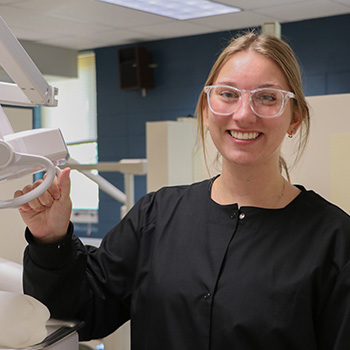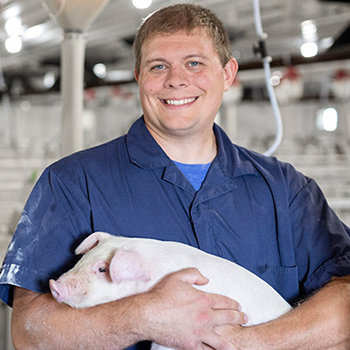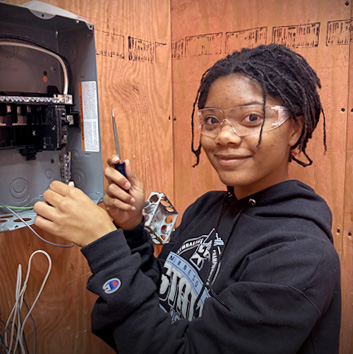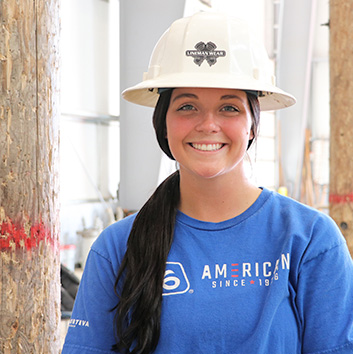Management Education Programs
Lamb and Wool Management: Member Producer Program
Program Goals
- Provide information and education in the areas of enterprise management, nutrition, health, breeding practices, lambing techniques, facility design and layout, marketing, economics of production, and record keeping that will lead to greater bottom line profits.
- Assist members in implementing sound, profitable management practices.
- Keep members informed of the latest research findings and new technologies available.
- Assist in identifying superior genetics and acquiring sound, high quality, productive breeding stock.
- Educate members on breeding, feeding, and marketing methods that will produce a uniform, high quality market lamb and wool clip that will receive a premium price.
- Assist members in developing and using effective financial and production record systems.
Pipestone Lamb and Wool Production Program Option
| Small Flock | Imtermediate Flock | Member Producer | Long Distance | Sheep Central Consulting |
|
| Number of Ewes | < 100 | 100-200 | Any number | Any number | Any number |
| Distance from Pipestone | < 125 miles | <125 miles | < 125 miles | 125-200 miles | > 225 miles |
| Farm Visits | 1 (Feb/Mar) |
1 (Feb/Mar) |
Minnesota Other States |
1 (Feb/Mar) Virtual Farm Visit (As Requested) |
Virtual Farm Visit (As Requested) |
| Farm Focus Groups | 1 (Dec/Jan) | 1 (Dec/Jan) | 1 (Dec/Jan) | 1 (Dec/Jan) | Invited |
| Classes & Meetings | X | X | X | X | Recorded Webinars |
| Phone/Email Access | X | X | X | X | X |
| Email Updates | X | X | X | X | X |
| Newsletters | X | X | X | X | X |
| Home Study Course |
X | X | X | X | Not Included |
| Enterprise Analysis |
X | X | X | X | X |
| Sheep Facility Tour | Full Cost | Full Cost | Full Cost | Full Cost | Full Cost |
| Lambing Time Short Course |
Full Cost | Full Cost | Reduced Fee | Reduced Fee | Reduced Fee |
Lamb and Wool Program Educational Activities
Farm Visits – Each producer will receive farm visits based on their selected program option. Each visit is about two hours long and covers questions and concerns about their sheep operation and assists them in applying innovative technology and management methods.
Virtual Farm Visits – Long Distance and Sheep Consulting options will receive scheduled/requested virtual farm visits via phone or video calling platform (e.g., Zoom, Teams). Visits are about 1-2 hours long and cover questions and concerns about their sheep operation.
Farm Focus Groups – Each program member is invited to a small group meeting at a central location. The farm focus meeting is designed to enhance sharing of ideas in a small group setting by touring the host farm and discussing current management principles, questions, and concerns. The meetings are approximately 2 ½ hours in length.
Classes & Meetings – Meetings on various management topics are presented throughout the year. Meetings are delivered in-person or webinar via Zoom. In-person meeting locations include Pipestone, MN; Spencer, IA; and Hawarden, IA. Guest speakers will also be invited to speak on pertinent subjects in their area of expertise via Zoom.
Phone & Email Access – Instructors are available by phone and email during office hours to answer specific management questions.
Email Updates – Each member will receive regular email updates often including lamb carcass prices and common commodity prices along with any additional timely and pertinent information.
Newsletters – Members receive quarterly newsletters which cover upcoming events, current industry news, and timely management information.
Home Study Course – This course includes 14 lessons which cover all aspects of modern sheep production. After completion of the course, lessons make good reference material.
Enterprise Analysis – Members are encouraged to submit financial and production records to be analyzed and are valuable in determining profitable management strategies.
On-Farm Demonstrations – Periodic sessions are held on member farms to demonstrate new management technologies.
Lambing Time Short Course – The short course is designed to cover specific lambing time management topics and tour successful lambing operations in either a virtual or in-person format. Full program, long distance, and sheep consulting members attend at a reduced fee (meal and bus cost only). Small and Intermediate flock members pay full rate for the short course.
Sheep Facilities Tour – All program options pay full rate for Sheep Facility Tour. This tour is only offered in June of even numbered years.
|
Questions or more information? Philip Berg Ryan Knuth |
Management Education Programs
Lamb and Wool Management: History
The Pipestone Lamb and Wool Management Program started in 1972 as a pilot program that was jointly funded by the National Sheep Industry Development Board (SID) and the Minnesota Department of Education. The basic purpose for starting the Pipestone Sheep Project was to boost the level of sheep management and production in southwest Minnesota by bringing modern, profitable management technology to member sheep producers and helping them properly implement these techniques on their individual farms.
The Pipestone Lamb and Wool Program works with member producers via four types of instructional methods. These include individual instruction, group instruction, class sessions, and email/phone consultation.
- Individual instruction takes place on the farm of each student enrolled in the program. These farm visits cover questions and concerns about each sheep operation and assist them in applying innovative technology and management methods.
- Class sessions are held on a regularly scheduled basis with various sheep management topics taught at each class. Classes often explore practical and new management practices. Classes are delivered in-person and/or webinar via Zoom.
- Group instruction consists of on-farm demonstration sessions, field trips, and hands-on experiences.
- Producers enrolled in the program often have management problems that occur and need to be dealt with right away. Instructors are available to consult via email, video conferencing, and/or phone calls.
The Pipestone Lamb and Wool Program has been very effective in improving the management level of many sheep operations. When the program started in 1972 there were about 52,000 breeding ewes within a 100-mile radius of Pipestone and the average lambing percentage was around 110%. Today, the same area has around 78,000 breeding ewes with an average lambing percentage marketed of approximately 170%.
This success has built a national reputation for the Pipestone Lamb and Wool Program through sheep management knowledge, education, production, and marketing. Because of this reputation and national demand for practical sheep management education, the program branched out to educate producers nationwide through online courses and short courses.
Today, the Pipestone Lamb and Wool Program continues to be considered the national sheep management information center and sheep management innovator as is evidenced by enrollment in its educational programs of about 250 producers/students annually from across the nation.
Education and consultation within the Pipestone Lamb and Wool Program largely revolve around low-cost feed ingredients, efficient labor use, low input costs, high production levels, and intensive management. The management system is based on achieving optimum production of a quality product. Our belief is that maximum profit is more important than maximum production.
Instructors in the program work with sheep producers in the Pipestone area and around the world through the member producer program, short courses/tours, newsletters and distance-delivered courses.
|
Questions or more information?
Philip Berg Ryan Knuth |
Management Education Programs
Lamb and Wool Management: Sheep Facility Tours
Sheep Facility Tour - June 2024
The Pipestone Sheep Facility Tour provides sheep producers at all levels of experience with real-world insights and applications of sheep facilities, including innovations in sheep buildings, low-labor lambing barns, handling systems, feeding systems, and facility design and flow. This year’s tour will focus on repurposing and reutilizing existing livestock facilities. The tour will be a full-day tour, visiting six outstanding Pipestone Lamb and Wool Program member operations. Each of the farm sites we will tour have designed their facilities and feeding systems to reduce labor, enabling them to increase their flock size with the same labor inputs. In addition, we will highlight the management philosophies of each of these outstanding sheep producers.
Tentative Tour Schedule: June 4, 2024
7:30 a.m. - Registration
7:45 a.m. - Bus leaves Minnesota West - Pipestone Campus
- Meshke Family Farm (repurposed poultry facilities)
- Aaron and Amber Case Farm (repurposed beef feeding facilities)
- Heath Houselog Farm (repurposed hog facilities)
- Dean Evers Farm (relocated and repurposed hog building)
- Gundermann Family Farm (repurposed hog facilities)
- Brian Winsel Farm (repurposed hog facilities)
6:45 p.m. - Arrive back at Minnesota West - Pipestone Campus
Farm Tour Stops
Meshke Lamb Co. (Garden City, MN)
The Meshke family manages a very productive flock of 750 ewes and have been members of the Pipestone Lamb and Wool Program since 1995. In 2018 they purchased and repurposed a turkey production site on a property adjacent to their home farm. The renovated barns feature drive-through feeding alleys and automatic waterers. They wave lamb groups of 200 ewes in two lambing barns, from January through April. Triplet-rearing ewes are held in a small grouping pen for an extended period of time to ensure a ewe is able to raise their lambs. For artificially reared lambs, lambs are self-fed milk using a bucket to reduce labor on these “bonus lambs.” Finishing lambs are moved to a side-ventilated building on the turkey site. Through the summer and fall, ewes are split between pasture and drylot. They have also recently installed a centrally-located working system to more efficiently handle groups of ewes and lambs. The operation is owned and operated by Blake and Sheryl Meshke, along with their son Brent and his daughter Leslie.
Aaron and Amber Case Farm (Garden City, MN)
Aaron and Amber Case joined the Pipestone Lamb and Wool Program in 2017 and have grown their flock to approximately 475 ewes. They have repurposed and remodeled existing cattle feeding facilities to meet the needs of their sheep operation. They have also added a pole shed and hoop barn to further invest in their farm site and make their facilities work for them. They utilize fence-line feeders in every pen, allowing them to feed silage-based rations. They have maximized their facility usage with accelerated lambing in the past. Their buildings are designed to help production flow. The ewes lamb in drop pens, are housed in lambing pens, are moved into a lean-to off their lambing barn in a small grouping pen, and are finally moved to a hoop barn or pole shed for large grouping pens. Aaron and Amber have invested in lambing barn cameras to help reduce night-checks and reduce animal stress in the lambing barn. Aaron and Amber have three sons.
Heath Houselog Farm (Ruthton, MN)
Heath is relatively a newcomer to the sheep industry, joining the Pipestone Lamb and Wool Program in 2018. Heath is very detail orientated and strives to increase the productivity of his sheep flock. Heath has recently expanded his sheep production by investing in a hog site, allowing him to grow his flock from 120 to 420 ewes in the past 2 years. Heath has also invested in Shearwell technology to better track sheep production records. In remodeling the hog barn, he combined two rooms and removed slats to make a drop area and lambing pens. He uses another room for artificial rearing, and the East wing as family housing and later lamb finishing. Heath has also invested in outdoor lots with a fence-line feeding system to reduce labor and manage multiple groups of ewes. This year, he installed a lambing barn camera to reduce the number of night checks. Heath and his wife Brittany have six kids.
Dean Evers Farm (Comfrey, MN)
Dean runs an extremely productive flock of approximately 200 ewes to help diversify his crop farming enterprise. Dean joined the Pipestone Lamb and Wool Program in 2000. Dean moved an old hog barn to his farm site and has repurposed it to become his lambing barn and help meet his sheep enterprise’s needs. He has been able to utilize the existing electrical and ventilation systems in this barn.
Dean uses low-labor feeding practices throughout the sheep production stages. In the lambing barn, a flex auger system delivers a soybean hull-based ration to the lambing pens and ewes in the dropping areas are fed along an outdoor fence-line feeder. Dean utilizes a hoop barn for both cold housing families and finishing lambs. In his hoop barn, he uses a repurposed Kewanee hay and grain elevator to convey a complete ration to ewes inside the hoop barn. Dean’s daughter Marlayna has recently bought into the sheep operation.
Gundermann Family Farm (Westbrook, MN)
Bruce & Karla Gundermann started their sheep business in 1996, with 25 ewes, after deciding to discontinue raising hogs and converting their facilities to sheep production. They joined the Pipestone Lamb and Wool Program in 1999 and, since then, grown their ewe flock to about 850 ewes. They have utilized existing buildings, built a new addition onto the lambing barn, and put up six hoop barns to improve labor efficiency and management of their various lambing groups. They employ several low-labor feeding systems such as self-feeding lactating ewes, fence-line feeding systems, and added a commodity shed. Bruce and Karla have a son Eli who helps with the operation and a daughter Kallie. Bruce and Karla were the recipient of the 2013 Pipestone Lamb and Wool Program Outstanding Producer.
Brian Winsel Farm (Holland, MN)
Brian Winsel joined the Pipestone Lamb and Wool Program in 2009 and has steadily grown his flock size to 1100 ewes. To accommodate this expansion, he has remodeled existing buildings to be a labor efficient lambing facility and has built additional cold housing with drive-through and in-pen feeding systems to reduce labor. Additionally, he has incorporated a working and shearing area into the same building and added another lambing area to the barn. He built four hoop barns for cold housing to accommodate flock expansion. Brian has also repurposed an outdated hog facility on a different site by removing slats and a cement pad to house lactating ewes and finishing lambs. Brian and his business partner Bryan Kruse were awarded the 2023 Pipestone Lamb and Wool Program Outstanding Producer.
Registration
Registration: To register, follow the link to the registration Registration Form form.
Cost: $185 per person
Minimum Enrollment: 30 people. Maximum Enrollment: 54 people.
Pipestone Campus information
Pipestone Lodging Information
North Dakota and Wisconsin residents will be charged a higher tuition cost unless a reciprocity form is completed. A copy of the completed reciprocity form must accompany the registration form. See reciprocity information for more details and the application form for your state. Follow the instructions on how to print and complete the form. Contact the Lamb and Wool program if you need help completing the reciprocity form. Reciprocity forms must be completed online.
| NORTH DAKOTA RECIPROCITY |
WISCONSIN RECIPROCITY |
South Dakota students should contact Minnesota West directly. South Dakota residents don’t need to send a form to their home state.
|
Questions or more information? Philip Berg Ryan Knuth |
Management Education Programs
Lamb and Wool Management: Sheep for Profit School
The Sheep for Profit School is the professional management and business school of the sheep industry. The purpose of the school is to help you improve your sheep management skills; increase the profitability of your sheep operation and form relationships in your business. The school will be intense and combine lectures, group discussions, and visits to outstanding Pipestone area sheep operations. Expert instructors with diverse and practical sheep experience will help you define your vision and build a practical plan to achieve your goals.
This three-day investment will change your sheep operation and your view of the sheep industry.
Course Details
Dates: July 12 - 15, 2023
Location: Minnesota West Community & Technical College, Pipestone Campus
| Before the School Activities Submit info for Sheep Enterprise Analysis Review Home Study Course lessons |
After the School Activities |
Wednesday, July 12, 2023 - 4:00 p.m. - 9:30 p.m.
|
|
|
Thursday, July 13, 2023 - 8:00 a.m. - 9:30 p.m.
|
Farm Tour
|
|
Friday, July 14, 2023 - 8:00 a.m. - 9:30 p.m.
|
Farm Tour
|
Saturday, July 15, 2023 - 8:00 a.m. - 11:30 a.m.
|
Registration
Cost: $595 (includes tuition, handouts, noon and evening meals, and breaks)
Minimum Enrollment: 10 operations. Maximum Enrollment 20 operations.
Campus & Lodging Information.
Complete Registration Form. *This form requires Acrobat Reader (free download).
North Dakota and Wisconsin residents will be charged a higher tuition cost unless a reciprocity form is completed. A copy of the completed reciprocity form must accompany the registration form. See reciprocity information for more details and the application form for your state. Follow the instructions on how to print and complete the form. Contact the Lamb and Wool program if you need help completing the reciprocity form. Reciprocity forms must be completed online.
| NORTH DAKOTA RECIPROCITY |
WISCONSIN RECIPROCITY |
South Dakota students should contact Minnesota West directly. South Dakota residents don’t need to send a form to their home state.
|
Questions or more information? Philip Berg Ryan Knuth |
Subcategories











